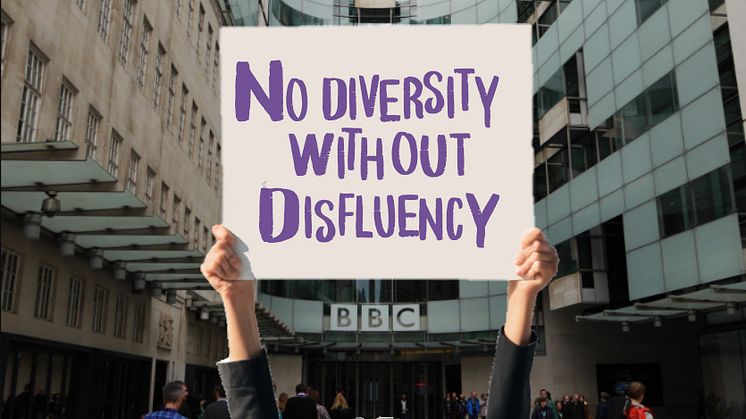
News -
Media Briefing for International Stammering Awareness Day, 22nd October
What are STAMMA doing?
- STAMMA will be handing in a 25,000 Petition to the BBC and ITV on International Stammering Awareness Day at noon on the 22nd October. This is the culmination of STAMMA'syear-long campaign ‘No Diversity without Disfluency’ by delivering a petition calling for better representation of people who stammer in the media, signed by over 25,000 signatories, shortly after noon to the BBC and ITV studios in Manchester and London. Joining the delegation at Broadcasting House will be members of STAMMA along with Patron Scroobius Pip.
- STAMMA are encouraging its members to ring a radio station over the weekend so that the public get to hear people who stammer talking - not being interviewed about their stammer.
- STAMMA have signed a Declaration on the Right to Stammer, along with 61 other stammering organisations around the world. We want the default position on stammering to be public acceptance that this is the way some people talk
Our Messages
-
We want stammering to be an ACCEPTED form of speech.
Programmes like Educating Yorkshire, ITV’s School for Stammerers, and films like The King’s Speech focus on how stammering can be managed or cured. The expectation that we shouldn’t stammer isn’t in keeping with this age of diversity and inclusion. We believe it’s fine to look for support and therapy, but its wrong to stigmatise stammering. -
We want to see people who stammer REPRESENTED in public life.
Apple didn’t see that linking their woozy face emoji with stammering was an issue in 2021 because we live in a society where comic representations of stammering are rife. The lack of public representation of people who stammer, the comic or negative representation of people who stammer, reinforces negative attitudes towards stammering. The behaviours of stammering are often misinterpreted and lead to discrimination at work, in exams, or at interviews. -
We want SPACE made for people who stammer.
The ignorance around stammering, the assumption that people can and should just learn to talk fluently creates intolerance around people’s stammered speech. How do we ensure that people who stammer can access goods and services – when so often people hang up on us when we’re on the phone? Or order a coffee and not be hurried, interrupted or laughed at? We need the media, all media, to help us create space for and platform people who stammer.
Facts About Stammering
Stammer or Stutter?
The two words mean the same thing, but in the UK and Ireland we tend to use the word stammer, whereas elsewhere people use the word stutter.
Numbers affected
Until recently, it has been suggested that 1% or less of adults stammer. These studies have largely depended upon listening to a person talk. But some people may hide a stammer and stammering is variable. At STAMMA we question such research. In our 2021 YouGov polling, 2% of UK adults said that they stammer. Until we can remove the shame and stigma from stammering, we are never really going to understand how much of the population it affects.
Children
Action for Stammering Children suggests around 8% of children stammer and that it usually starts between 2-4 years of age, as the brain is developing. For many, stammering will gradually disappear over time, bit others will continue stammering into adulthood.
Gender
Previous research suggests more men than women stammer. Our own polling with YouGov reveals more balanced numbers.
Race
It has nothing to do with ethnicity, language or country.
Hidden/covert stammer
Some people can sound fluent or hide their stammer, even from loved ones, and for many years. The strain of sounding fluent - the shame of not being yourself, the fear of being caught out and stammering - can be hugely stressful.
Saying one’s name
Because your name is the one thing you can’t change, very often it becomes the hardest thing to say for people who stammer.
Neurodiversity
Stammering reflects many of the facts and traits of the whole neurodiverse community. There’s a spectrum of how much it affects people; it’s developmental, it can vary from day to day, it is commonly asserted to affect more men than women, and it is often hereditary.
Is stammering a disability?
The definition of a disability, under the Equalities Act 2010, is that it’s essentially a condition that is long term and interferes with day-to-day activities. Not everyone will fall into this category, but many will.
Interviews
We can arrange interviews with people who stammer for regional TV and radio and arrange representatives of STAMMA for any national coverage.

